Reversing the Backward Progress of Social Justice

Photo: Gayatri Malhotra on Unsplash.
These days, ‘social justice’ has gained a reputation as nothing more than a buzzword. In a time of global crises and rapid advancement, inequality and division are growing. Is reversing the backward progress of social justice globally possible?
Social Justice and Global Crises
Social justice is about fair and equal access to resources and opportunities to achieve a dignified life. Access to wealth, food, healthcare, education, decent work, and a safe and clean environment, among others, are key aspects of social justice. Meanwhile, the world is facing multiple crises at once. We are navigating a world impacted by the COVID-19 pandemic, climate change, and geopolitical unrest that result in economic, food, and energy crises.
While 10% of the world’s wealthiest own 52% of global income, millions who had just escaped working poverty are now back below – or close to it – the poverty line. With rising inflation driving food and energy prices higher and higher, real wages are plummeting. This issue hit lower-income earners the most as nominal adjustments of minimum wages are rendered meaningless in terms of real value.
More than 200 million people worldwide are unemployed, and education is disrupted. As a result, a rising number of young people are not in employment, education, or training. Srinivas Tata, Director of the Social Development Division of the UN Economic and Social Commission for Asia and the Pacific (ESCAP), notes, “Most workers are ill-equipped to respond to emerging megatrends of climate change, aging societies, and digitalization.”
In the Global Risks Report 2023, business leaders worldwide identify the energy supply crisis, cost-of-living crisis, and rising inflation as the top risks for 2023. Cost-of-living remains a concern for two years in the future, along with natural disasters and geoeconomic confrontation. For the ten-year mark, the top risks are littered with climate change issues.
Global Coalition for Social Justice
Still, there is hope for global, forward progress in social justice. The International Labour Organization (ILO) aims to launch a Global Coalition for Social Justice in 2023 to create a global momentum to reduce inequalities and prioritize social justice. The Coalition shall “provide the framework to foster policy coherence and investments for social justice and decent work globally and at country level.” Its five priority areas are:
- Gender equality, non-discrimination, and inclusion
- Transition from the informal to the formal economy
- Just transition towards environmentally sustainable economies and societies
- Decent work in supply chains
- Decent work for crisis response.
After the World Economic Forum 2023, Director-General of ILO Gilbert Houngbo wrote, “There is a willingness and determination in the international world to work together. There is also an emerging understanding that we must collaborate to address economic, social, and environmental concerns on an equal basis.”

Subscribe to Green Network Asia
Strengthen your personal and professional development with cross-sectoral insights on sustainability-related issues and sustainable development across the Asia Pacific and beyond.

Nazalea Kusuma
Naz is the Manager for International Digital Publications at Green Network Asia. She once studied Urban and Regional Planning and has lived in multiple cities across Southeast Asia. This personal experience has exposed her to diverse peoples & cultures and enriched her perspectives. Naz is an experienced and passionate writer, editor, translator, and creative designer with a decade worth of portfolio.


 Looking into Biochar as a Bioremediation Agent
Looking into Biochar as a Bioremediation Agent  Australian Climate Visa for Citizens of Tuvalu: Showcasing cross-border partnership in light of the climate crisis
Australian Climate Visa for Citizens of Tuvalu: Showcasing cross-border partnership in light of the climate crisis  Nickel Mining in Raja Ampat and the Widespread Cost of Natural Resource Exploitation
Nickel Mining in Raja Ampat and the Widespread Cost of Natural Resource Exploitation  Lumbung Sosial: Challenges and Opportunities of Indonesia’s Social Barn Program
Lumbung Sosial: Challenges and Opportunities of Indonesia’s Social Barn Program  A Worrying State of Insect Decline
A Worrying State of Insect Decline  GEF Approves Funding for Biodiversity Conservation Projects in Indonesia
GEF Approves Funding for Biodiversity Conservation Projects in Indonesia